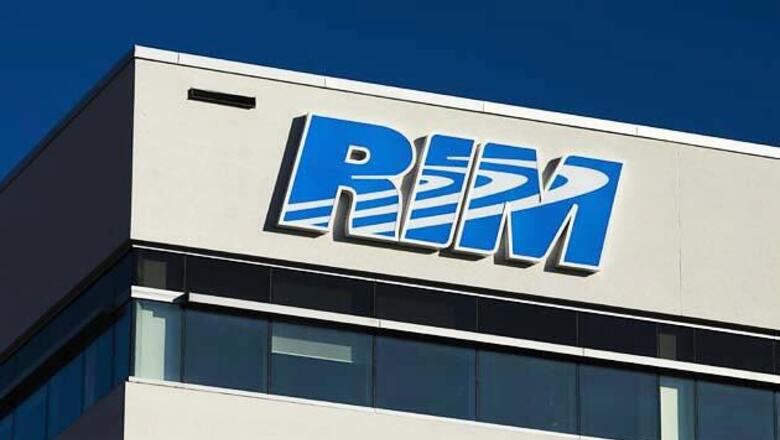
views
Waterloo: Research In Motion Ltd., the maker of the BlackBerry, is in steep decline. The company, once the crown jewel of the Canadian technology industry, is now worth 1 percent of Apple's market capitalisation. One way for RIM to stop the downward tailspin: It could sell itself to a competitor or financial firm. But who would step up to buy RIM -and why?
Late Tuesday, the company said it expects to post an operating loss for the current quarter, a sign that BlackBerry sales are falling even faster than analysts expected. On Wednesday, the company's stock hit its lowest level since 2003, the year RIM went from making two-way e-mail pagers to smartphones.
The stock has fallen 93 per cent since their peak in 2008. Since then, the BlackBerry's dominance as the smartphone for on-the-go business people has been eviscerated by Apple Inc.'s iPhone, and more recently, by phones running Google Inc.'s Android software. Research firm IDC says BlackBerrys now account for 6.4 per cent of the global smartphone market, a third of what they had two years ago.
In that time, the company's financial performance has suffered. RIM reported a 25 per cent revenue decline in the latest fiscal quarter, to $4.2 billion from $5.6 billion. For the full fiscal year that ended on March 3, it earned $1.2 billion, or $2.22 per share, on revenue of $18.4 billion. That's down from net income of $3.4 billion, or $6.34 a share, on revenue of $19.9 billion in fiscal 2011.
RIM issued the dire warning about its business Tuesday, adding that it will lay off a "significant" number of employees.
Still, the company is defiant. Chief executive, Thorsten Heins, says he can turn things around with the help of fresh smartphone software. Heins joined RIM four years ago and was most recently its chief operating officer. He replaced co-CEOs Balsillie and Mike Lazaridis in January after the company lost tens of billions in market value.
"My charter from the board of directors is very clear: long-term value creation with RIM," Heins told The Associated Press in an interview at the company's headquarters in Waterloo, Ontario, earlier this month.
Analysts give RIM only a slight chance of coming out of the crisis. To hedge its bets, the company has hired bankers to look at its options. It's not actively looking to sell itself, Heins said, but it wants to be prepared.
"We are prudent because we know the situation is somewhat challenging," Heins said. "So we are just looking at everything that could be an option. That doesn't mean we are pulling on those options. But we need to understand ... what is our field of action that we could take in case we need to?"
As RIM's prospects worsened, last year marked a turning point in the way analysts assess RIMs value. Instead of treating it like a company with a future, they started looking at it as a collection of parts that could be split up and sold separately to the highest bidder.
Michael Walkley at Canaccord Genuity believes most of the company's value lies in the monthly fees it gets from phone companies in exchange for running the systems that deliver email and Web pages to BlackBerrys.
RIM has 78 million users connected to this system, but Walkley estimates that only 20 million are corporate and government users who are likely to stick around because of the communications security RIM provides. The rest are consumers who will jump to competing phones, he believes. That business is worth about $2.75 billion to a competitor, Walkley wrote in a research report Wednesday.
The other major component of RIM's value is its patent portfolio. The company had an early scare in US patent courts in 2006, when it was forced to pay $612.5 million to a small company founded by an inventor who had patents on wireless e-mail delivery. Since then, it's filed for thousands of patents to use as a defense against future suits.
Patents on wireless technologies exploded in value last year, as Apple and Microsoft Corp. started suing makers of phones that run Google's Android software. Countersuits followed. A consortium that included Apple and RIM bought the patents of a defunct Canadian maker of telecommunications gear, Nortel, for $4.5 billion last year. That compares with the $1.13 billion Nortel's once-prominent wireless networks business fetched in 2009.
As a counter-move, Google bolstered its own patent portfolio by buying Motorola Mobility Holdings Inc., a US phone maker with only slightly better prospects than RIM, for $12.5 billion.
Where does that leave RIM? Christopher Marlett, the CEO of MDB Capital, said RIM's patents are worth more than $1 billion, and could be worth as much as $4 billion if a bidding war develops between Apple, Google, Microsoft Corp. and perhaps Samsung Electronics Co.
"It's a question of how aggressive they get," Marlett said. His firm is an investment bank that focuses on intellectual property, including patents.
Walkley puts the value of RIM's portfolio at $2.5 billion, excluding the patents RIM bought from Nortel and shares with Apple, Microsoft and other buyers.
RIM has $2.1 billion in cash, but Walkley discounts this completely, since the phone business will likely start using up cash soon, and downsizing will require severance payments. That means the email network and the patents comprise RIM's entire value at $5.25 billion, by his estimate.
That's very close to RIM's current market capitalization, at $5.4 billion, though a buyer could be expected to pay a premium.
The cash cushion also means that RIM is in no imminent danger of going bankrupt. But as the shares decline, RIM is likely to face increasing pressure from shareholders to unlock the company's value through a sale, and to abandon the comeback plan.
A possible middle ground would be to sell the patent portfolio while keeping the rest of the company. Two months ago, AOL, once a pioneering Internet service provider, sold and licensed its patents - which are more modest than RIM's for $1 billion- to Microsoft.
Microsoft is one company that's been suggested as a potential RIM buyer. The software juggernaut is trying to get back into smartphone software, but its Windows Phones haven't been popular so far. Buying RIM could give it a chance to establish itself as a provider of trusted wireless email services, though moving subscribers from BlackBerry to Windows could be challenging.




















Comments
0 comment